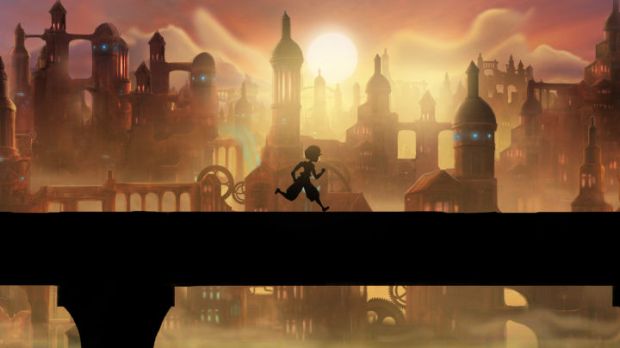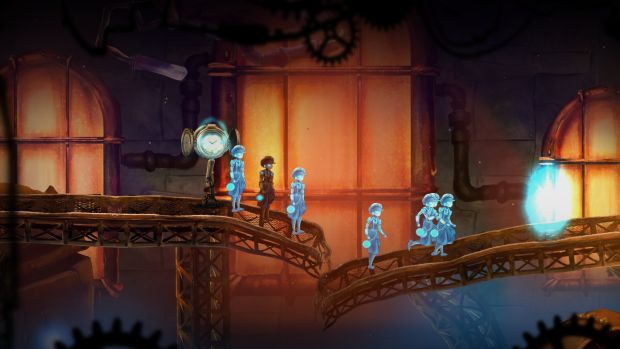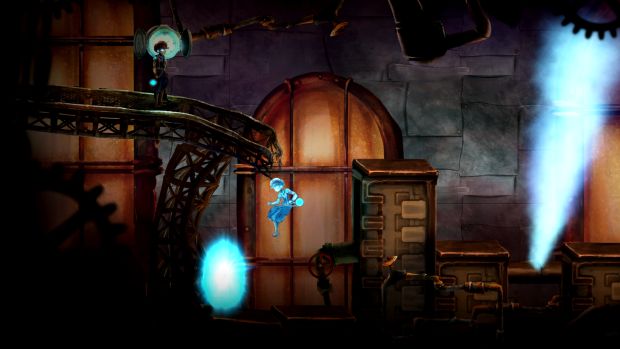
Appsquare’s Clockwork may feature a premise you’re used to several times over – using clones in a “Record, Repeat” fashion, for instance – but it’s realized in an intriguing new world. The game appears vibrant but with telltale blues standing out in the proceedings. If you ever had to paint time, this would be the way to do it and Clockwork succeeds in establishing a unique atmosphere of sorts. But surely there must be more to this puzzle platformer than attractive visuals and clocks?
We spoke to Appsquare CEO Vishal Gumber about Clockwork and went into the inspiration behind the game, along with how the time clone mechanics work. Gumber also talks a bit about the lack of co-op and developing for the current gen of consoles and PC.
"The story revolves around a mechanical boy named Atto, who after encountering an entity named Milli, finds that they can manipulate time. Milli, who is encompassed in his pocket watch, is the origin of this power."
Rashid K. Sayed: Where did the idea for Clockwork come about?
Vishal Gumber: The idea for Clockwork came from the collaboration of ideas between our artist, Arianne Elliott and designer/programmer, Adam Pinto. Their adoration for other puzzle games, with beautiful art and clever puzzles drew them to create Clockwork by merging their passion. Once the idea was in, the art helped us dictate the story as we could envision this world coming to life.
Rashid K. Sayed: What can you tell us about the story? Is Atto’s ability to create duplicates and move through time related to the plague surrounding the world?
Vishal Gumber: The story revolves around a mechanical boy named Atto, who after encountering an entity named Milli, finds that they can manipulate time. Milli, who is encompassed in his pocket watch, is the origin of this power. The story itself connects all the dots in the game, although we can’t say much more without entering spoiler territory.
Rashid K. Sayed: Tell us about several of the visual touches you’ve used to enhance the atmosphere of Clockwork.
Vishal Gumber: Clockwork is definitely the word to keep in mind regarding the look of this game. We’re constantly working on developing the atmosphere. We explore a wide variety of color to define each area. We look for good combinations that match the environment, and compliment the universal blue energy that is concurrent through the world. From oranges, to reds and purple, we look to blend those tastefully with the bright blues of Clockwork.
Rashid K. Sayed: The duplication technique of Atto is interesting as it seems there are portions where you control both the original and the clone simultaneously and other portions where you don’t. How does it work?
Vishal Gumber: Being able to control the time copies simultaneously is a bit of a visual misconception. The time control mechanic functions with much more simplicity than that. For example, if after triggering the clock the player presses a button, after reverting back a duplicate will be created that will go and press the same button. Essentially, you are recording your actions and a duplicate will replicate those actions, freeing you to do other things.
"From what can be seen so far of the game, we mainly showcased the very base mechanic. You can expect a lot more interaction with the time duplicates, and the physics involved will play a much more important role to come."
Rashid K. Sayed: Given that Clockwork is coming to the Xbox One, PS4 and PC, what benefits have you observed from working on each platform? What resolution and frame rate will Clockwork run at for both consoles?
Vishal Gumber: The main benefit is that they are all high-performance machines, allowing us to push our artistic endeavors that much further. That being said, we haven’t specifically tailored the game to those consoles. Our roots come from projects with simpler fidelity, so we’ll naturally be working up from that idea. Resolution and frame rate depend largely on the specifications of the platforms. We’ll be aiming for whatever performance serves the delivery of our game the best.
Rashid K. Sayed: Will be there a co-op mode for players to sink their teeth into, similar to how Child of Light handled its companion system?
Vishal Gumber: No, there won’t be co-op for our game. We’ve discussed it at the start, and have decided that it wasn’t what we were hoping to deliver. The mechanics and story are only tailored to a single player experience.
Rashid K. Sayed: The game promises to have intriguing puzzles. What kind of puzzles can we expect and what was the thought process behind developing them?
Vishal Gumber: From what can be seen so far of the game, we mainly showcased the very base mechanic. You can expect a lot more interaction with the time duplicates, and the physics involved will play a much more important role to come. The main thought process to develop the puzzle is to engage the player to think differently when looking at obstacles. We’ll show them how it basically works, and then apply those rules with more conditions to consider tacked above it.
Rashid K. Sayed: There have been a variety of 2D platformers released recently like Ori and the Blind Forest and Axiom Verge. How will Clockwork offer its own unique approach and gameplay?
Vishal Gumber: We haven’t compared ourselves to to recent releases so much. We’re hoping to deliver a riveting story and tell it through challenging gameplay. Many of the obstacles reflect the world the game is set in. Clockwork finds its individuality from the dark tone the story takes on, we’re seeing these young characters deal with a harsh world, and we’re not afraid to show that in Clockwork.
Rashid K. Sayed: What are your thoughts on the various indie policies at Sony and Microsoft? Have you found either to be significantly more beneficial than the other?
Vishal Gumber: At this stage, we haven’t delved into the policies of either companies. We’re glad they have them in this day and age, but for both we simply need to manage the required specifications for their release.
"We’ve received Xbox One Dev Kits from Microsoft, so we have received support for Clockwork. We’ll be developing functionality for it once we reach the next stage of our build."
Rashid K. Sayed: As an indie developer how difficult is it to launch across several platforms at one?
Vishal Gumber: Well, we don’t really know for certain. We haven’t launched Clockwork yet. That aside, all platforms are quite lenient with their indie releases it seems. All platforms have their own processes and services for indie games to release, it’s really just a matter of getting approved.
Rashid K. Sayed: From a purely technical perspective, what is your take on the PS4 and Xbox One? What makes them different yet similar to each other?
Vishal Gumber: We have yet to take a really close look at the technical side of how they function. Both have their own methods of getting a build working on them. What’s similar is that they have requirements from frame rate, to resolution and just overall performance. That makes them both different from each other but catering to a spec is something we don’t have to deal with so much on PC. With PC it’ll always vary from machine to machine.
Rashid K. Sayed: Do Sony and Microsoft offer any help in launching your game on their platforms? Or is the case of solo effort in development?
Vishal Gumber: We’ve received Xbox One Dev Kits from Microsoft, so we have received support for Clockwork. We’ll be developing functionality for it once we reach the next stage of our build.
Rashid K. Sayed: When can we expect Clockwork to release?
Vishal Gumber: We’re currently looking at Q4 2015.
Rashid K. Sayed: Is there anything else you want to tell us before we let you go?
Vishal Gumber: As we’re designing out and seeing the game work the way we hope to achieve it, there is so much more to come than what’s been seen so far. All of which we’re incredibly excited to show. Check our website, or Facebook page and follow us on Twitter. We’re always showing off new parts we’re working on and any development we make.
















